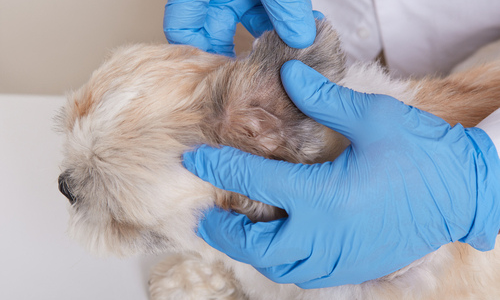Signs That Your Pet May Have Cancer
As unfair as it may seem, cancer isn’t just a human disease. Your furry friends may also be affected by the potentially deadly illness. Learning about common signs of cancer during Pet Cancer Awareness Month in November can help you protect your pet’s health.
Common Signs of Cancer in Pets
If your pet displays any of these signs, it’s time to pay a visit to your veterinarian:
- Lumps and Bumps – Lumps and bumps, particularly ones that seem to be getting bigger, are a cause for concern. Although growths aren’t always cancerous, it’s important to rule out the disease. Conduct a home exam to look for lumps, bumps, sores, and other signs of health problems at least a few times every month.
- A Change in Appetite – If your normally ravenous dog, cat, or small animal has suddenly lost interest in eating, you’ll need to determine the cause of the sudden change. Your pet may not enjoy mealtime if tumors make eating painful or trigger nausea.
- Weight Loss – Eating less will certainly cause your pet to lose weight, but weight loss can also occur even if your pet’s eating habits haven’t changed.
- Bad Breath – All pets have bad breath occasionally. If the odor is particularly strong and never improves, a tumor may be the cause. Diabetes, or kidney, liver, or gum disease can also cause bad breath.
- Enlarged Lymph Nodes – Some lumps may actually be enlarged lymph nodes. Lymph nodes remove waste and germs from your pet’s body and may become swollen if your pet is sick or has a form of cancer called lymphoma. Lymphoma is more common in cats than dogs, according to the American Veterinary Medical Association. Lymph nodes in dogs and cats are located on either side of the jaw, in front of the shoulders, on the groin, and behind the knees.
- Vomiting or Diarrhea – All pets experience diarrhea and vomiting occasionally, particularly if they eat something they shouldn’t. Frequent vomiting or diarrhea are unmistakable signs of illness and can lead to dehydration if not treated promptly.
- Disinterest in Usual Activities – Pets who are sick or have cancer may become lethargic and lose interest in playing, going for walks, and other activities.
- Swollen Abdomen – Call your veterinarian as soon as possible if your pet’s abdomen begins to swell, and the animal isn’t pregnant. Abdominal swelling can be caused by bleeding, cancerous tumors, parasites, or bloat.
- Difficulty Walking – Lameness may also be a sign that your pet has cancer. If cancer invades your pet’s bones, walking or jumping may become painful or difficult.
- Coughing or Trouble Breathing – Persistent coughing or difficulty breathing may occur if your pet has cancer. If you notice that your pet is struggling to breathe, call or visit your veterinarian immediately.
- Sores That Don’t Heal – Sores or ulcers that never seem to get better may also be cancerous.
- Difficulty Defecating or Urinating – Tumors may make it difficult or impossible to urinate or defecate. If your pet hasn’t urinated in 24 hours, seems to be in pain, or strains to urinate or defecate, let your veterinarian know right away. In addition to cancer, trouble urinating can be caused by a urinary tract blockage that could kill your pet if treatment isn’t begun immediately.
- Bleeding – Bleeding from the nose, mouth, ears, penis, vagina, rectum, or other parts of the body should be evaluated. In some cases, bleeding may be related to an injury that’s difficult to see. Bleeding, even if you only notice it once or twice, warrants a trip to the veterinarian.
Does your pet have any of these cancer signs and symptoms? Contact our office to schedule an appointment for your pet.
Sources:
https://www.avma.org/resources/pet-owners/petcare/cancer-pets

